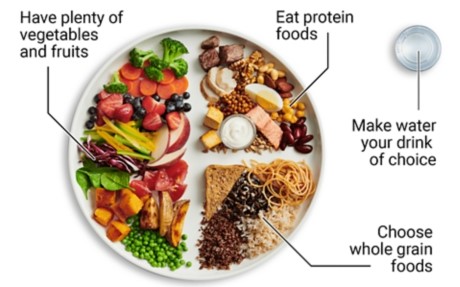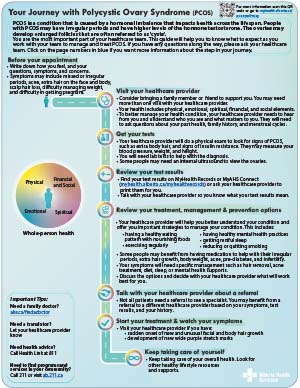Everyone needs their own specific treatment, management, and prevention plan. Your treatment choices will depend on your history, symptoms, risk factors, and what is important to you.
You and your healthcare provider will discuss what options are available. You know your health best. You can participate fully as a member of the care team by:
- asking questions
- sharing your healthcare goals
- sharing how you want your chosen support persons involved
Learn about being an active part of your care and building strong relationships with your healthcare team with
Alberta Health Services Shared Commitments.
PCOS TREATMENT, MANAGEMENT, AND PREVENTION OPTIONS
Lifestyle changes
A healthy eating pattern and regular physical activity are key strategies for managing PCOS in any stage of life. Addressing these areas can help improve your quality of life and prevent long-term health problems.
Nutrition
There is no single approach to healthy eating that works to improve symptoms of PCOS, but having a healthy eating pattern with nutritious foods that meet your energy and nutrition needs is recommended. Eat a variety of healthy foods each day, guided by
Canada’s food guide.
- Eat whole foods rather than processed foods. Reduce foods that are high in sugar, salt, and saturated fats.
- Eat vegetables and fruit. Fresh or frozen are both good options.
- Eat protein-rich foods (lean meats and plant proteins like lentils, soy, and tofu).
- Eat whole grain foods.
- Make water your main drink.
Find more information on
choosing and preparing healthy food.
All patients with PCOS can benefit from nutrition counselling. Your healthcare provider may recommend you see a registered dietitian for nutrition counselling. You can also call Health Link at 811 to talk to a dietitian or
fill out a form to have a Health Link dietitian call you.
If you worry about having enough money for food or struggle to find healthy food, visit
211 Alberta to find out about financial benefits, programs, and services near you. 211 is available any time, day or night, by phone (call 211), text, and online chat.

Credit: All Rights Reserved. Canada's Food Guide. Health Canada. Adapted and reproduced with permission from the Minister of Health, 2019.
Physical activity
Exercise regularly and take steps to meet the
Canadian 24-Hour Movement Guidelines.
Choose physical activities that you enjoy.
Weight
Work towards staying at a healthy weight. This is the weight at which you feel good about yourself, have energy for work and play, can manage your PCOS symptoms, and can prevent and manage other conditions like diabetes and heart disease.
Healthy eating patterns, nutritious foods, and physical activity can help you achieve your best weight and lower your pre-diabetes and heart disease risk.
Learn more about managing your health and weight with the
Weight Management Resource Toolkit.
Smoking
Think about reducing or quitting smoking. Talk to your healthcare provider about stop-smoking programs or learn more about
resources and supports available in Alberta.
Medicines
To manage your unwanted hair growth, irregular periods, body weight, and diabetes risk, your healthcare provider may recommend hormone treatment like contraceptive pills, medicines that block the action of testosterone, and metformin, which helps regulate glucose. They may recommend injectable medicines to help with weight loss.
Your healthcare team may also talk with you about medicines to address your specific needs and risk factors for conditions associated with PCOS.
Supplements
At times, over-the-counter supplements may be used in people with PCOS. If your blood tests show low levels of certain nutrients (nutrient deficiency), your healthcare team may recommend nutrient-rich foods and dietary supplements.
Vitamin D is recommended for all Albertans. A multivitamin with folic acid is recommended for everyone who is able to get pregnant. If you are planning to become pregnant, you should start taking prenatal vitamins with folic acid.
Talk with your healthcare team about using supplements. There is currently limited evidence to support recommendations for specific supplements for PCOS symptoms.
Managing your symptoms
Irregular periods
- Healthy eating patterns, good sleep patterns, physical activity, and weight management may improve irregular periods and your ability to ovulate.
- Your healthcare team may prescribe medicines to better regulate hormones, such as hormone contraceptives, to improve irregular periods.
Unwanted hair growth
There are many ways to remove unwanted, excess hair:
- shaving
- plucking
- laser hair removal
- electrolysis
- epilation
These have different costs and different long-term effectiveness. Before removing hair, ask your healthcare provider about what may work best for you and about the risks of infection and scarring.
You can also talk with your healthcare provider about hormone medicines to improve and prevent excess hair growth.
Acne
Acne treatment may include non-prescription or prescription medicines that you put on your skin (topical) or take by mouth (oral).
A healthy diet, maintaining a healthy weight, and being active can also help manage your acne.
Fertility
If you have PCOS, you may have difficulty getting pregnant. Being active, losing weight or maintaining a healthy weight, and good nutrition can have positive impacts on your fertility. Even a modest weight loss may help improve ovulation.
You may need a referral to a fertility specialist from your healthcare provider.
Mental health and quality of life with PCOS
Mental health and quality of life can be a big concern with PCOS because of the physical symptoms, hormones, challenges with fertility, body image, and long-term health concerns. You may be at a higher risk of depression, anxiety, and eating disorders, and you may experience emotional challenges like mood changes, distress, and low self-esteem.
Talk with your healthcare team about your mental health and emotions. Visit
Help in Tough Times for a list of reliable resources and services in Alberta.
Working with your healthcare team
You are the most important part of your healthcare team. Tell your healthcare provider:
- What has worked for you in the past to manage your current condition?
- What types of things help you work better with your healthcare team?
- What do you expect and need from the relationship with your healthcare provider?
- What impact is PCOS having on things that are important to you, like your job, hobbies and interests, and relationships?

Polycystic Ovary Syndrome (PCOS) Pathway
Download or print the
full patient pathway (PDF) and
summary (one-page PDF) to learn more about how to manage and treat PCOS.
Patient Pathway  Summary
Summary 
